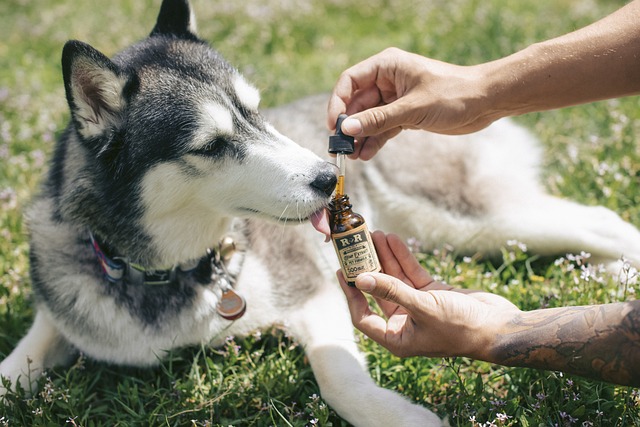Heavy Metals Testing for CBD is an essential component of ensuring consumer safety and maintaining product integrity within the growing health and wellness market. Given the potential health risks associated with heavy metals like lead, mercury, arsenic, and cadmium, it is imperative that CBD products undergo rigorous testing at various stages of production using advanced analytical techniques such as Inductively Coupled Plasma Mass Spectrometry (ICP-MS). This guarantees the absence of harmful contaminants and upholds compliance with health and safety regulations. Consumers can trust CBD products more when they have third-party Certificates of Analysis (CoAs), which provide evidence of testing results, thus ensuring transparency and product purity. By choosing CBD products that have been certified by reputable bodies or tested under ISO standards, consumers can be confident in the safety and quality of their CBD purchases.
Navigating the complex landscape of CBD products necessitates a thorough understanding of their composition and safety. As consumers increasingly turn to these items for wellness, the integrity of CBD products is paramount. This article delves into the critical aspect of heavy metals testing in CBD, highlighting its role in fostering consumer trust. We explore regulatory standards, labeling practices, and advanced testing techniques that ensure product safety and purity. Understanding the sources of contamination and the impact of undetected heavy metals is essential for both producers and consumers. By adhering to best practices and utilizing state-of-the-art testing methods, CBD manufacturers can guarantee the quality and safety of their products. Consumers too have a role in verifying the heavy metals content, ensuring they receive safe and beneficial items. Join us as we uncover the importance of heavy metals testing for CBD and its influence on consumer trust.
Understanding CBD and the Importance of Heavy Metals Testing

Understanding the complexities of cannabidiol (CBD) is crucial for consumers seeking its therapeutic benefits. CBD, a non-psychoactive compound found in the cannabis plant, has garnered significant attention due to its potential health advantages. As the demand for CBD products grows, so does the necessity for rigorous quality control measures. Among these measures, heavy metals testing for CBD stands out as an essential practice. The presence of heavy metals like lead, mercury, arsenic, and cadmium can pose serious health risks, potentially leading to adverse effects that range from minor discomfort to severe illnesses. Heavy metals testing ensures the safety and efficacy of CBD products by detecting trace amounts of these harmful substances. This testing process is not merely a compliance check; it is a cornerstone of trust in the CBD industry. It safeguards consumers, confirming that the products they use are both pure and compliant with regulatory standards. By adhering to heavy metals testing for CBD, manufacturers demonstrate their commitment to product integrity and consumer safety, thereby enhancing trust and credibility within the marketplace. Consumers can then confidently incorporate these products into their wellness regimens, knowing that they are free from dangerous contaminants.
Regulatory Frameworks Governing CBD Products and Metal Contaminant Limits

The trust consumers place in CBD products is paramount, and it is bolstered by stringent regulatory frameworks that ensure product safety and efficacy. Among these regulations, heavy metals testing for CBD is a critical component. Regulatory bodies like the Food and Drug Administration (FDA) in the United States have established guidelines to limit the presence of potentially harmful heavy metals such as lead, arsenic, mercury, and cadmium. These limits are designed to align with the safety standards set forth by agencies like the Environmental Protection Agency (EPA), ensuring that CBD products meet the same rigorous standards as other dietary supplements. The testing protocols mandate that manufacturers routinely analyze their products for heavy metal content throughout all stages of production, from raw hemp material to the final product. This consistent oversight helps maintain consumer confidence and ensures product safety by reducing the risk of exposure to these toxic elements. Consumers can trust CBD products more when they are backed by transparent reporting of test results, which demonstrates a commitment to quality and safety. Adherence to these regulations not only protects public health but also fosters an environment where consumers feel assured about the integrity and purity of their CBD purchases.
The Role of Accurate Labeling in Consumer Trust for CBD Products

In the realm of consumer trust, accurate labeling stands as a cornerstone in the credibility of CBD products. The transparency of a product’s contents is paramount; it assures consumers that what they see on the label corresponds with the actual ingredients and concentrations within the product. This trust is not only built on the honesty of the label but also on the supporting evidence of testing for potential contaminants, such as heavy metals. Heavy Metals Testing for CBD is a critical procedure that ensures products are free from harmful substances like lead, mercury, and arsenic. This testing is conducted to align with regulatory standards and to provide consumers with peace of mind regarding the safety and purity of the CBD they consume. The rigor of such tests reinforces the brand’s commitment to quality and consumer welfare, thereby fostering a foundation of trust that is essential for long-term customer relationships. Moreover, the availability and transparency of these test results can further enhance consumer confidence, as it demonstrates a proactive approach towards safety and compliance with industry regulations. Accurate labeling, coupled with reliable testing protocols like Heavy Metals Testing for CBD, plays a pivotal role in building and maintaining consumer trust, which is essential for the overall success and integrity of the CBD market.
Sources of Heavy Metals Contamination in CBD Products

Consumers increasingly rely on cannabidiol (CBD) products for health and wellness, yet concerns about heavy metals contamination persist. The presence of heavy metals such as lead, arsenic, mercury, and cadmium can stem from various sources throughout the CBD product lifecycle. The agricultural process, including soil contamination or the use of contaminated water for irrigation, is one potential source. Furthermore, improper extraction methods or the reuse of extraction solvents without adequate purification can introduce heavy metals during the production phase. Additionally, cross-contamination can occur during manufacturing and packaging if proper hygiene and facility cleanliness protocols are not strictly followed. The reliability of CBD products hinges on rigorous heavy metals testing for CBD, which is a critical quality control measure to ensure consumer safety. This testing involves analyzing each batch of CBD extract for trace amounts of heavy metals that could be harmful to human health. Implementation of stringent testing standards and adherence to Good Manufacturing Practices (GMP) are essential to safeguard the trust in the CBD market and maintain product integrity, thereby protecting consumer health. Regular third-party testing is a cornerstone of this process, as it provides an impartial verification of the product’s safety and compliance with regulatory standards. It is through such measures that manufacturers can guarantee their products are free from harmful contaminants, fostering trust and reliability among consumers.
Advanced Techniques in Heavy Metals Testing for CBD Quality Assurance

To ensure the safety and efficacy of CBD products, rigorous quality assurance protocols are paramount. Among these, heavy metals testing is a critical component that safeguards consumer health by detecting potential contaminants such as lead, mercury, arsenic, and cadmium. Advanced techniques in heavy metals testing for CBD have evolved from traditional methods to more sophisticated analytical approaches like Inductively Coupled Plasma Mass Spectrometry (ICP-MS) and X-ray Fluorescence (XRF) spectroscopy. These methods offer high sensitivity and specificity, enabling the detection of trace amounts of heavy metals that could compromise product integrity. The implementation of these techniques ensures that CBD products meet stringent regulatory standards set forth by agencies like the FDA. By adopting these advanced testing methods, manufacturers can provide consumers with CBD products that not only offer therapeutic benefits but are also free from harmful substances, thereby fostering a heightened sense of trust and reliability in the marketplace. The commitment to utilizing cutting-edge technology for heavy metals testing is a testament to the industry’s dedication to quality assurance and consumer safety, ultimately driving the growth and credibility of CBD products on a global scale.
Impact of Undetected Heavy Metals on Product Safety and User Health

The presence of heavy metals in consumer products, particularly in sensitive areas such as healthcare and dietary supplements, poses significant risks to user health and product safety. In the realm of CBD (cannabidiol) products, where consumers seek wellness and therapeutic benefits, the absence of heavy metal contamination is non-negotiable. Heavy metals like lead, mercury, arsenic, and cadmium can lead to chronic health issues if ingested over time. These metals may inadvertently find their way into CBD products through the growing, processing, or manufacturing stages. The impact of such contamination is profound, potentially causing harm that ranges from mild toxicity to severe health complications. Therefore, heavy metal testing for CBD is a critical step in ensuring product trustworthiness and user safety. It serves as a safeguard against the introduction of harmful substances, providing consumers with confidence in the products they use. Rigorous testing protocols must be implemented and consistently adhered to, ensuring that each batch of CBD undergoes thorough analysis for heavy metal content before reaching the market. This commitment to quality control is paramount in maintaining consumer trust and upholding legal standards within the industry.
Best Practices for CBD Producers to Ensure Heavy Metals Safety

To safeguard consumer trust and uphold the integrity of their products, CBD producers must implement robust protocols for heavy metals testing. The presence of heavy metals in CBD products poses significant health risks, necessitating stringent quality control measures. Producers should prioritize sourcing hemp from certified organic farms with verifiable histories free from contamination. Regular testing at each stage of the production process is critical; this includes initial agricultural testing, followed by rigorous tests during product formulation and finally on the final product before it reaches the consumer. Utilizing state-of-the-art analytical techniques such as Inductively Coupled Plasma Mass Spectrometry (ICP-MS) ensures precision and reliability in detecting even trace amounts of heavy metals. By adhering to standards that are in alignment with regulatory bodies like the FDA, CBD producers can demonstrate a commitment to product safety and consumer well-being, thereby fostering a foundation of trust within the marketplace. It is not enough to simply comply with regulations; proactive measures and transparency in reporting test results further enhance consumer confidence and reputation management for the brand. With heavy metals testing for CBD being a non-negotiable aspect of product development and distribution, these best practices are essential for maintaining the highest standards of safety and quality in the CBD industry.
How Consumers Can Verify Heavy Metals Content in CBD Products

Consumers increasingly seek out products they can trust, especially in the health and wellness sector where purity and safety are paramount. In the realm of CBD products, ensuring the absence of heavy metals is crucial for maintaining consumer confidence. Heavy metals testing for CBD is a rigorous process that involves using specialized analytical methods to detect even trace amounts of contaminants such as lead, mercury, arsenic, and cadmium. These heavy metals can potentially harm human health if ingested in sufficient quantities. Reputable manufacturers implement this testing at various stages of production to guarantee the integrity of their products. Consumers can verify the heavy metals content by looking for Certificates of Analysis (CoAs) from third-party laboratories, which provide detailed information about the product’s safety and composition. These CoAs should be easily accessible, often on the company’s website or upon request, and they offer transparency that helps build trust. Additionally, purchasing CBD products certified by relevant authorities or those that have undergone ISO accredited testing further assures consumers of the product’s purity and safety from heavy metals contamination. By being well-informed and vigilant, consumers can make safer choices regarding their CBD intake, ensuring they choose products that prioritize their health and safety.
